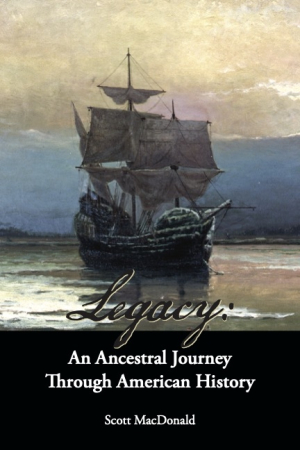Legacy
An Ancestral Journey Through American History
Observing the development of the US as a nation through a single American family, Legacy is a personalized, microcosmic history text.
Legacy is a tale of US history distilled through Scott MacDonald’s family genealogy and the different perspectives of those family members who witnessed the unfolding of the American experiment.
The book opens with a description of its origins in MacDonald’s interest in the genealogy of his family. As MacDonald traced his lineage, he saw a larger purpose behind sharing it: “The story of my family is in many respects the story of America.” Observing his family and others, he notes that immigrants were important to the success of the American experiment. To support this perspective, he traces his family’s immigration patterns on both his mother’s and his father’s side. And, indeed: as the book progresses, the rationale behind its central conceit becomes more convincing. While some of the people covered are observable only as faint shadows who left little documentation behind, others left extensive paper trails that allow MacDonald to analyze their lives in greater detail.
The book’s language is direct, declarative, and unobtrusive. Its historical accounts of episodes like the wagon train migration west are described with attention-holding details, as with a list of items typically taken on such a journey. In the end, however, its work remains unwieldy. It unevenly balances its historical observations with its more personal genealogical history. It includes a chapter on religious groups, including the Huguenots, who immigrated to the US, but without making those pieces connect to MacDonald’s family tree in a clear manner. The chapter on the lost colony of North Carolina’s Outer Banks also underplays its genealogical connection.
The book does its best work when it remains mindful of its organizing principle. Its discussion of a specific branch of the MacDonald family tree, whose members settled in upstate New York, is stronger, though it underutilizes the particulars of Dutch immigration to that area. And its little-known story of Stephen Hopkins, who was the only person to be on the Mayflower and also present at the Jamestown colony, is intriguing. Still, as it moves between historical accounts and family tales, some of the book’s material begins to seem extraneous, as with a discussion of the Old North Church in Boston and two of the genealogical subjects who had affiliations with it, during which Henry Wadsworth Longfellow’s poem “Paul Revere’s Ride” is reproduced in its long entirety.
Legacy is an unusual, personalized history text about events that shaped the US and one of its immigrant families.
Reviewed by
Matt Benzing
Disclosure: This article is not an endorsement, but a review. The publisher of this book provided free copies of the book and paid a small fee to have their book reviewed by a professional reviewer. Foreword Reviews and Clarion Reviews make no guarantee that the publisher will receive a positive review. Foreword Magazine, Inc. is disclosing this in accordance with the Federal Trade Commission’s 16 CFR, Part 255.

